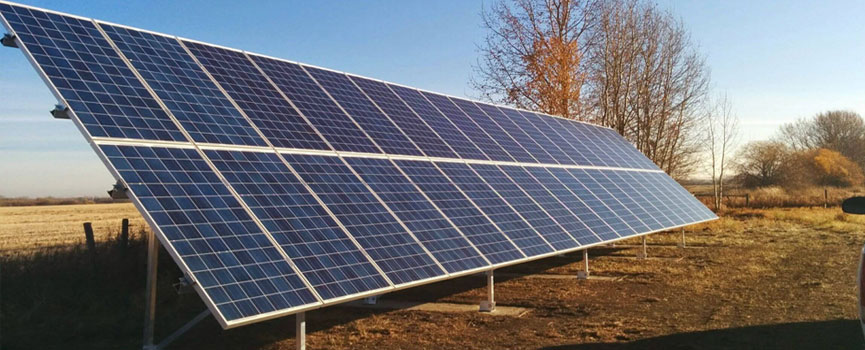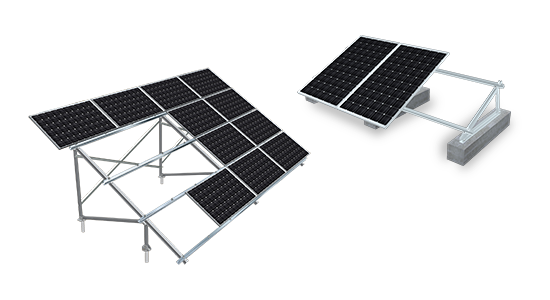Pros and Cons of Ground-Mounted Solar Systems

A ground-mounted solar system is a structured frame fixed on the ground that supports PV panels for power generation. There are mainly two types: fixed tilt and tracking systems. Fixed tilt systems offer stability and easy installation, while tracking systems adjust panel positions to follow the sun, maximizing energy capture. Although tracking systems can boost energy production by roughly 20%, they require more engineering and pose potential risks, such as damage from high winds or increased maintenance costs.
Ground-mounted solar systems are usually more efficient than roof-mounted systems because they can be installed in areas with fewer obstructions, so the panels can be fixed at an optimal angle and direction. In addition, ground solar racking can be fitted with bifacial solar panels, and dual panels can convert more sunlight into electricity. This increase in energy production can pay back your investment in solar panels much faster.
This blog post will help you determine if ground-mounted solar panels are the right fit for your needs. We'll introduce the advantages and disadvantages of ground-mounted systems and compare them to rooftop solar panels to help you make the correct decision.
Types of Solar Ground Mount Systems
1. Standard Ground-Mounted Systems
This option mirrors rooftop installations, securing solar panels onto metal frames. The peak of these installations is often tilted slightly, and the frames, frequently steel, may adjust occasionally to optimize sunlight capture.
The appeal of this setup lies in its cost-effectiveness. It is less expensive and simpler to install and maintain compared to its pole-mounted counterparts.
Refer to this standard ground-mounting video: https://www.youtube.com/watch?v=w9OkxOBm3C8
2. Pole-Mounted Systems
These systems involve driving a pole deep into the ground, upon which a rack equipped with tracking panels is mounted. The tracking features, typically a mix of sensors and motors, pivot the panels to track the sun's trajectory, boosting panel efficiency by 25% or more. With ground-mounted arrays, you have the option to select from single or dual-axis tracking systems.
Refer to this solar pole rack video: https://www.youtube.com/watch?v=ywxEPtFZA5k
Pros of Solar Ground Mount Systems

Location Flexibility
You can position these systems for maximum sun exposure, avoiding shadows from surrounding obstacles. This positioning often results in enhanced efficiency and greater energy output.
Angle Optimization
Adjustable brackets enable you to modify the solar panel orientation seasonally or even daily to follow the sun's path. This flexibility maximizes energy capture.
Simplified Maintenance
Ground-level access facilitates cleaning, inspection, and maintenance, ensuring optimal performance and potentially reducing long-term costs.
Future Expansion
You can readily expand your ground-mounted system if your energy needs increase. Adding panels to an existing ground array is generally more straightforward than expanding a rooftop system.
Improved Cooling
Ground-mounted panels experience better airflow and, consequently, operate at cooler temperatures. Since high temperatures can decrease efficiency, this translates to improved energy production.
Enhanced Safety
While faulty wiring poses a fire risk in any solar system, a ground-mounted configuration isolates those risks from your home. These systems also utilize independent electrical grounding, further mitigating potential hazards.
Added Functionality
Your ground-mounted solar array can serve dual purposes. It can provide shade as a carport or canopy for vehicles and patios. It can also become a designated spot for charging your electric vehicle.
Cons of a Solar Ground Mount

Mibet Australia Ground Mounted Solar Array
Space Requirements
A major limitation of ground-mounted solar systems is their considerable demand for space. This often renders them impractical for urban settings or properties where land is scarce.
Additional Permitting
Local zoning laws might require special permits to build new structures on your property. Approval times can vary greatly based on location, potentially taking anywhere from a few days to several months.
Higher Initial Costs
Ground mounts need a newly built structure, unlike roof installations that attach directly to existing rafters. This leads to higher initial costs compared to roof-based solar systems.
Extra Wiring
Ground-mounted systems require extended wiring to link the panels to your home. It's advisable to bury these additional wires to safeguard them against damage from squirrels and other wildlife.
Positioning Your Ground-Mounted Solar Panels
While you can install ground-mounted solar panels at a distance from your property, keep in mind that greater distances translate to higher installation costs.
This cost increase stems from the wiring required to connect the panels to your home's electrical system. Longer distances necessitate more wiring materials, directly impacting the overall installation expenses.
Furthermore, longer wiring runs demand thicker gauge wires to mitigate voltage drop. Voltage drop refers to the reduction in electrical pressure as electricity travels over a distance. A significant voltage drop can hinder the performance of your home's electrical appliances, making it very important to use appropriately sized wiring.
Ground-Mounted Solar Panels vs Roof-Mounted

For many homeowners, ground-mounted solar arrays often present a better alternative to rooftop installations. Although rooftop solar panels are a popular choice, considering a ground-mounted system could provide several benefits.
When you examine costs, ground-mounted solar racking systems generally match rooftop panels in terms of price per watt. Should your rooftop be unsuitable due to structural limitations or inadequate space, opting for a ground-mounted system might prove more economically beneficial over time.
Rooftop solar systems are limited by the specific attributes of your roof. If the angle is incorrect—for instance, not south-facing—or if obstructions like shade or chimneys exist, your system's efficiency will be significantly reduced. On the other hand, ground-mounted panels offer the flexibility to be placed in the most advantageous locations on your property.
For households with high electricity needs, a typical rooftop may not provide enough space for a system that meets your requirements. In such cases, ground-mounted solar panels offer a viable solution, allowing you to meet your energy needs without space constraints.
Should You Consider a Ground-Mounted Solar System?
Deciding on a ground-mounted solar panel system often depends on your specific situation. Typically, you might encounter higher initial costs, but these can be offset by greater savings over the system's lifetime due to enhanced efficiency. Each project has its own unique aspects, and we are eager to assist you in evaluating various scenarios.
We can provide customized ground-mount solar systems, though we typically offer additional options as well, including rooftop systems and floating solar systems. These solutions are customized according to your needs to maximize the use of available space and enhance potential energy production.
Why Trust Us?

As a leading provider in the renewable energy sector, Mibet delivers reliable ground-mounted PV mounting systems for large-scale solar power plants worldwide. We design utility-scale and commercial ground mounts to deliver peak performance in all soil types and weather conditions. To accommodate various ground conditions, we provide a wide range of foundation choices, including driven posts, helical piles, ground screws, and ballasted options. For large solar projects, our GT series ground systems provide an exceptional cost-benefit balance.


